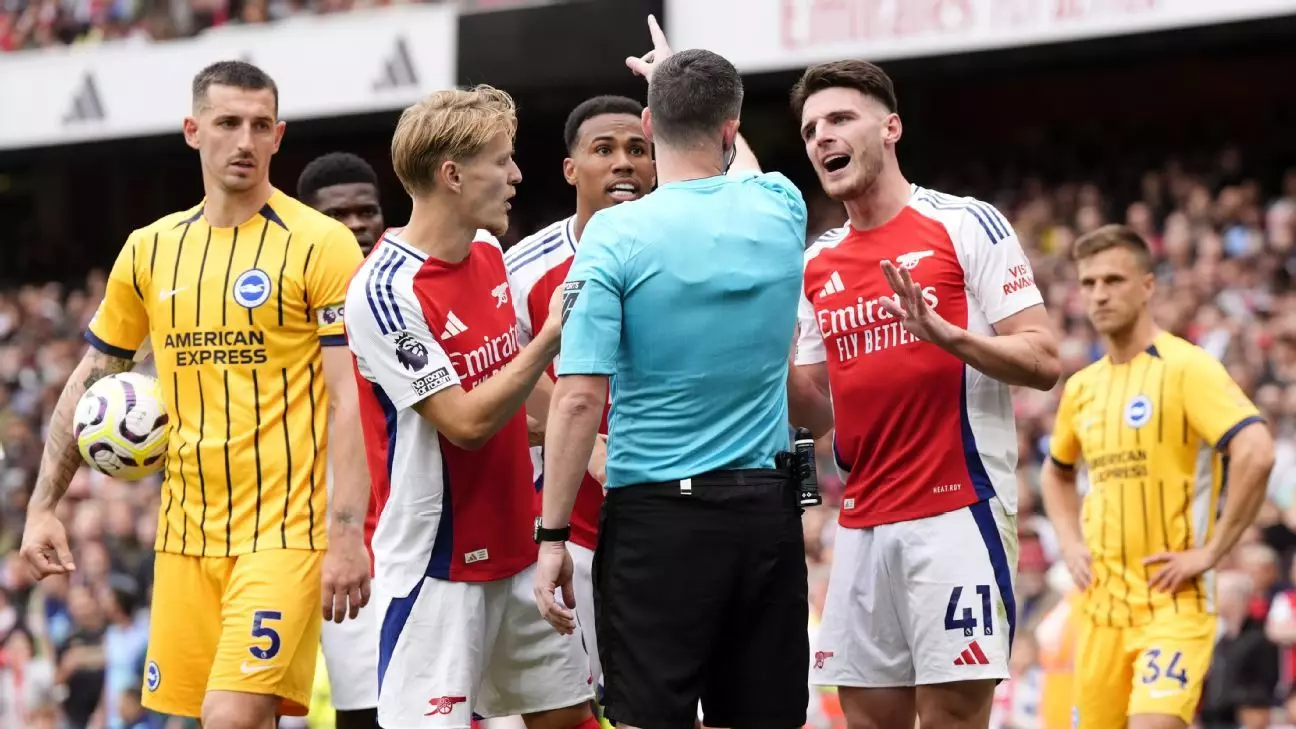The world of football is rife with controversies, and referees often find themselves in the eye of the storm. The recent incident involving Arsenal midfielder Declan Rice highlights the challenges officials face on the pitch. Through the lens of a newly released audio segment from the Premier League, we gain unique insights into the decision-making processes that underpin the sport.
In a recent episode of “Match Officials Mic’d Up,” Chris Kavanagh, the referee who issued the controversial red card to Declan Rice, discusses the weight of his decisions. The incident occurred during a match where Rice was already on a yellow card. His action of kicking the ball away to delay a free kick placed the referee in a position where he felt compelled to issue a second yellow card. Kavanagh’s admission, “I don’t like it, but he’s knocked the ball,” underscores the internal conflict referees often experience. They strive to maintain the flow of the game while adhering to the rules that govern the sport.
This duality is palpable; Kavanagh acknowledges that he was put in an “awful position.” He voices frustration that Rice’s actions forced his hand. This narrative is not uncommon for referees, who must balance the strict interpretation of rules with the dynamic nature of play. The emotional toll of making such decisions can weigh heavily on officials, especially when the stakes are high and emotions run rampant among players, coaches, and fans alike.
The introduction of Video Assistant Referees (VAR) has been both a boon and a point of contention in modern football. Howard Webb, the chief operating officer of the Professional Game Match Officials Limited (PGMOL), provided context to Kavanagh’s decision. Webb stated that messages have been conveyed to players about the importance of not interfering with the ball after the whistle. This communication is crucial, as it sets the tone for how players are expected to conduct themselves on the field.
In the same discussion, Webb addressed the differing standards applied to players when it comes to delaying the game. He acknowledged that Brighton’s Joao Pedro should have faced a yellow card for similar infractions, illustrating a perceived inconsistency in officiating. Such disparities can lead to frustration among players and managers, who seek fairness and a level playing field.
The debate over VAR’s effectiveness remains ongoing. Webb noted instances when VAR intervention is necessary, like the case of Everton’s Dominic Calvert-Lewin. In this regard, Webb’s commentary highlights the importance of a well-functioning VAR that supports officials rather than undermining their authority. Moreover, he admitted to errors made by VAR regarding a disallowed goal for Bournemouth, underscoring that while technology aids refereeing, it is not infallible.
Implications for Future Matches
The discussions surrounding these particular incidents serve as an important reminder of the complexities involved in football officiating. As Kavanagh’s case demonstrates, referees cannot merely act on instinct; they must also adhere to established protocols. This need for adherence may sometimes clash with the spirit of the game, especially when decisions impact the outcome of tightly contested matches.
Understanding these nuances is vital for fans, who often react passionately to what they perceive as poor officiating. The Premier League’s initiative to mic up referees is a step towards fostering greater transparency, allowing supporters insight into the referees’ thought processes. Through these efforts, the league hopes to bridge the gap between fans and officials, ultimately creating a more empathetic understanding of the challenges that referees face.
As football continues to evolve with technological advancements and heightened scrutiny, the role of referees remains central to ensuring the integrity and fairness of the game. It’s essential for all stakeholders in football—clubs, players, officials, and fans alike—to appreciate the difficult position referees occupy and support initiatives that promote clarity and understanding in officiating. The future of football will undoubtedly involve grappling with these complexities, but dialogue and transparency are crucial in navigating these waters.
